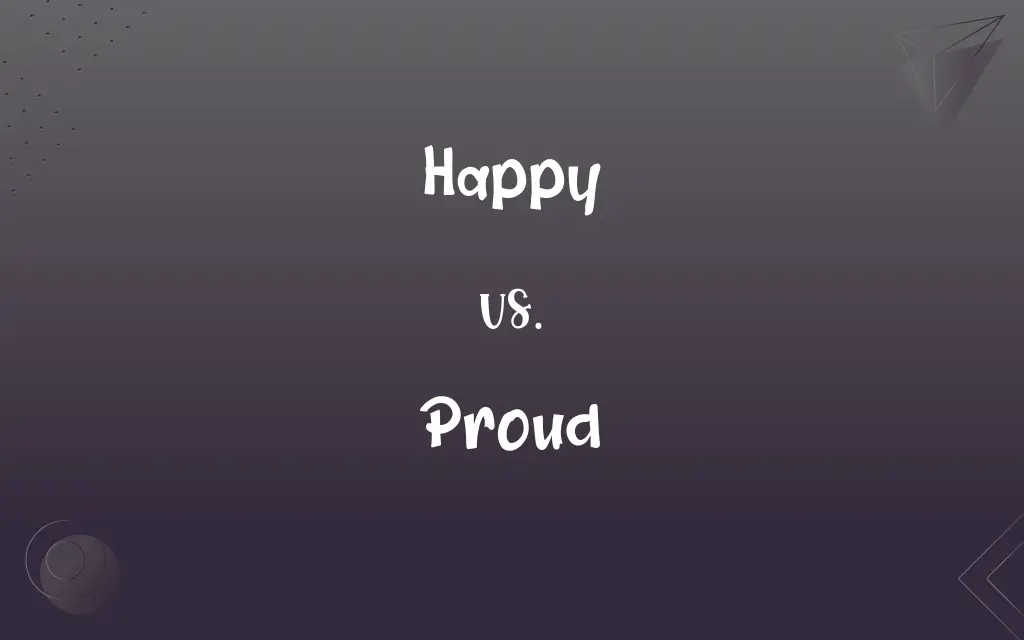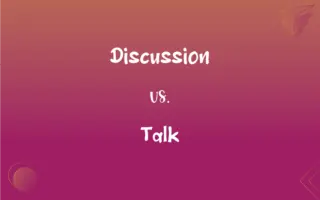Happy vs. Proud: What's the Difference?
By Janet White || Updated on March 4, 2024
Happiness is a broad emotional state characterized by feelings of joy, contentment, and well-being. Pride is a feeling of satisfaction or fulfillment derived from one's own achievements, qualities, or possessions, or those of someone closely related.

Key Differences
Happiness encompasses a wide range of positive emotions that can arise from various sources, including fulfilling relationships, achievements, or even simple pleasures. It is an overarching state that signifies contentment and satisfaction with life in general. Happiness can be fleeting, tied to specific moments or experiences, or it can be a more persistent state of being, reflecting an overall sense of fulfillment and well-being. On the other hand, pride is more narrowly defined and typically connected to accomplishment or the recognition of one's own worth or the worth of others associated with oneself. Pride can stem from personal achievements, overcoming obstacles, the accomplishments of friends or family members, or the possession of admired qualities or items.
Happiness is considered a fundamental goal or desire for many people, often seen as a key indicator of life satisfaction and psychological health. It can be influenced by a wide range of factors, including social connections, personal freedom, physical health, and economic stability. Conversely, pride is often related to social comparison and self-esteem, reflecting how individuals perceive themselves in relation to others. While pride can contribute to happiness by enhancing self-esteem and a sense of belonging, excessive pride can lead to arrogance or a sense of superiority, which can negatively impact social relationships.
Culturally, happiness is universally sought after and celebrated as an essential component of a fulfilling life. It is often the subject of philosophical, religious, and psychological studies aiming to understand and enhance human well-being. Pride, while generally positive when it reflects healthy self-esteem and accomplishments, can vary in its social acceptability depending on cultural norms and values. In some cultures, pride is highly valued as a sign of competence and success, while in others, it may be viewed with caution or skepticism, especially if it appears to overshadow humility or communal values.
The pursuit of happiness is often seen as a personal and collective endeavor, with many societies creating conditions that foster well-being and joy among their citizens. The expression of pride, however, is more individualistic, focusing on personal or closely associated others' achievements and qualities. Both emotions play significant roles in motivation, social bonding, and personal development, highlighting different aspects of the human experience.
Despite their differences, happiness and pride are interconnected; achievements that evoke pride can contribute to an individual's overall happiness, and being in a state of happiness can enhance one's self-esteem and sense of pride in one's identity and life circumstances.
ADVERTISEMENT
Comparison Chart
Definition
A state of well-being and contentment.
Satisfaction from one's own achievements, qualities, or possessions.
Source
Broad and varied, including relationships, achievements, and pleasures.
Specific to achievements, qualities, or connections to others' successes.
Cultural Perception
Universally sought and celebrated.
Viewed positively, but with caution in some cultures against arrogance.
Impact on Self
Fundamental for psychological health and life satisfaction.
Enhances self-esteem and social status, but can lead to arrogance if excessive.
Social Context
Related to overall life conditions and emotional well-being.
Often linked to social comparison and individual or associated accomplishments.
ADVERTISEMENT
Happy and Proud Definitions
Happy
A feeling of joy and contentment with life.
Finding a new hobby brought her immense happiness.
Proud
A feeling of self-respect and achievement.
She felt a deep sense of pride after finishing the marathon.
Happy
Experienced in both momentary pleasures and long-term fulfillment.
His happiness was evident when he spent time with family.
Proud
Can contribute to one's self-esteem and confidence.
His pride in his work boosted his confidence in his abilities.
Happy
Essential for mental and emotional well-being.
Regular exercise contributed to his overall happiness.
Proud
Requires balance to avoid crossing into arrogance.
He maintained his pride without becoming arrogant.
Happy
Influenced by a variety of internal and external factors.
Achieving work-life balance significantly increased her happiness.
Proud
Often related to personal or close others' accomplishments.
The parents beamed with pride at their child's graduation.
Happy
A universal goal across different cultures and societies.
People around the world pursue happiness through various means.
Proud
Valued differently across cultures, reflecting various social norms.
In her culture, expressing pride in one's achievements was encouraged.
Happy
Enjoying, showing, or marked by pleasure, satisfaction, or joy
A happy child.
The happiest day of my life.
Proud
Feeling pleasurable satisfaction over an act, possession, quality, or relationship by which one measures one's stature or self-worth
Proud of one's child.
Proud to serve one's country.
Happy
Cheerful; willing
Happy to help.
Proud
Occasioning or being a reason for pride
A proud moment when she received her diploma.
Happy
Characterized by good luck
A happy sequence of events.
Proud
Feeling or showing justifiable self-respect
Too proud to beg.
Happy
Being especially well-adapted; felicitous
A happy turn of phrase.
Proud
Filled with or showing excessive self-esteem
A proud and haughty aristocrat.
Happy
Characterized by a spontaneous or obsessive inclination to use something. Often used in combination
Trigger-happy.
Proud
Of great dignity; honored
A proud name.
Happy
Enthusiastic about or involved with to a disproportionate degree. Often used in combination
Money-happy.
Clothes-happy.
Proud
Majestic; magnificent
Proud alpine peaks.
Happy
Having a feeling arising from a consciousness of well-being or of enjoyment; enjoying good of any kind, such as comfort, peace, or tranquillity; blissful, contented, joyous.
Music makes me feel happy.
Proud
Spirited. Used of an animal
Proud steeds.
Happy
Experiencing the effect of favourable fortune; favored by fortune or luck; fortunate, lucky, propitious.
Proud
Feeling honoured (by something); feeling happy or satisfied about an event or fact; gratified.
I am proud of Sivu’s schoolwork.
Happy
Content, willing, satisfied (with or to do something); having no objection (to something).
Are you happy to pay me back by the end of the week?
Yes, I am happy with the decision.
Proud
That makes one feel proud (of something one did)
That was not the proudest thing I did but I can’t deny it.
Happy
(Of acts, speech, etc.) Appropriate, apt, felicitous.
A happy coincidence
Proud
Possessed of a due sense of what one deserves or is worth.
I was too proud to apologise.
Happy
(in combination) Favoring or inclined to use.
Slaphappy, trigger-happy
Proud
Having too high an opinion of oneself; arrogant, supercilious.
Happy
Dexterous, ready, skilful.
Proud
Generating a sense of pride; being a cause for pride.
It was a proud day when we finally won the championship.
Happy
Implying 'May you have a happy ~' or similar; used in phrases to wish someone happiness or good fortune at the time of a festival, celebration, or other event or activity.
Happy birthday!, Happy Fourth of July!, Happy anniversary!, Happy job-hunting!
Proud
(Of things) standing upwards as in the manner of a proud person; stately or majestic.
Happy
A happy event, thing, person, etc.
Proud
Standing out or raised; swollen.
After it had healed, the scar tissue stood proud of his flesh.
The weld was still a bit proud of the panel, so she ground it down flush.
Happy
Often followed by up: to become happy; to brighten up, to cheer up.
Proud
(obsolete) Brave, valiant; gallant.
Happy
Often followed by up: to make happy; to brighten, to cheer, to enliven.
Proud
Feeling or manifesting pride, in a good or bad sense
Nor much expectA foe so proud will first the weaker seek.
O death, made proud with pure and princely beauty !
And shades impervious to the proud world's glare.
Happy
Favored by hap, luck, or fortune; lucky; fortunate; successful; prosperous; satisfying desire; as, a happy expedient; a happy effort; a happy venture; a happy omen.
Chymists have been more happy in finding experiments than the causes of them.
Proud
Having a feeling of high self-respect or self-esteem; exulting (in); elated; - often with of; as, proud of one's country.
Are we proud men proud of being proud ?
Happy
Experiencing the effect of favorable fortune; having the feeling arising from the consciousness of well-being or of enjoyment; enjoying good of any kind, as peace, tranquillity, comfort; contented; joyous; as, happy hours, happy thoughts.
Happy is that people, whose God is the Lord.
The learned is happy Nature to explore,The fool is happy that he knows no more.
Proud
Giving reason or occasion for pride or self-gratulation; worthy of admiration; grand; splendid; magnificent; admirable; ostentatious.
Till tower, and dome, and bridge-way proudAre mantled with a golden cloud.
Happy
Dexterous; ready; apt; felicitous.
One gentleman is happy at a reply, another excels in a in a rejoinder.
Proud
Feeling self-respect or pleasure in something by which you measure your self-worth; or being a reason for pride;
Proud parents
Proud of his accomplishments
A proud moment
Proud to serve his country
A proud name
Proud princes
Happy
Enjoying or showing or marked by joy or pleasure or good fortune;
A happy smile
Spent many happy days on the beach
A happy marriage
Proud
Having or displaying great dignity or nobility;
A gallant pageant
Lofty ships
Majestic cities
Proud alpine peaks
Happy
Experiencing pleasure or joy;
Happy you are here
Pleased with the good news
Happy
Marked by good fortune;
A felicitous life
A happy outcome
Happy
Satisfied; enjoying well-being and contentment;
Felt content with her lot
Quite happy to let things go on as they are
Happy
Exaggerated feeling of well-being or elation
Happy
Well expressed and to the point;
A happy turn of phrase
A few well-chosen words
A felicitous comment
FAQs
Can pride lead to happiness?
Yes, feelings of pride in one's achievements or qualities can enhance overall happiness by contributing to self-esteem and a sense of fulfillment.
Are there different types of happiness?
Yes, happiness can be categorized into momentary pleasures and longer-term contentment, each stemming from different sources and experiences.
Is happiness more important than pride?
While both emotions contribute to well-being, happiness is often considered more fundamental to overall life satisfaction.
How can excessive pride be harmful?
Excessive pride can lead to arrogance, which might strain relationships and hinder personal growth by limiting openness to feedback and new experiences.
What role does comparison play in feelings of pride?
Social comparison can influence pride, as individuals may measure their achievements against those of others, impacting their sense of accomplishment and self-worth.
Is it possible to feel happiness without pride?
Yes, happiness can arise from sources unrelated to personal achievement, such as relationships, hobbies, or personal well-being, independent of pride.
What strategies can increase feelings of happiness?
Strategies to increase happiness include cultivating gratitude, engaging in activities that bring joy, maintaining positive relationships, and practicing mindfulness.
Can someone feel pride for someone else's achievements?
Yes, people often feel pride for the achievements of friends, family, or even groups they identify with, reflecting a sense of shared identity and connection.
How do cultural values influence expressions of happiness and pride?
Cultural values shape how openly happiness and pride are expressed, with some cultures emphasizing communal well-being and others valuing individual achievement.
How can one achieve a healthy sense of pride?
A healthy sense of pride can be achieved by setting and accomplishing personal goals, recognizing one’s own efforts and achievements, and maintaining humility.
Can technology influence our experiences of happiness and pride?
Technology can influence happiness and pride through social comparison on social media, access to achievements recognition platforms, and facilitating connections that bring joy.
How does the pursuit of happiness differ across life stages?
The pursuit of happiness can vary across life stages, with changing priorities, roles, and values influencing what brings joy and satisfaction at different times in life.
How do personal values affect the experience of pride and happiness?
Personal values determine what individuals find prideful or joyful, influencing their goals, pursuits, and satisfaction with outcomes.
Does happiness affect physical health?
Yes, happiness has been linked to various positive physical health outcomes, including lower stress levels, improved immune function, and longer life expectancy.
How does pride influence motivation and achievement?
Pride can serve as a powerful motivator, encouraging individuals to set higher goals and strive for excellence to maintain or enhance their sense of accomplishment.
How do life changes impact happiness and pride?
Significant life changes can impact happiness and pride, either positively by achieving milestones or negatively through challenges that affect self-esteem and well-being.
What is the relationship between pride and self-identity?
Pride is closely tied to self-identity, as feelings of accomplishment and the recognition of personal qualities contribute to how individuals perceive and value themselves.
Can societal norms suppress expressions of happiness or pride?
Yes, societal norms can sometimes suppress expressions of happiness or pride, especially if displaying such emotions is viewed as inappropriate or boastful in certain cultures.
Is pride always related to personal achievement?
While often related to personal achievement, pride can also stem from associations with group accomplishments, cultural heritage, or other forms of collective identity.
Can pursuing pride negatively affect happiness?
If the pursuit of pride focuses too much on external validation or surpassing others, it can detract from intrinsic happiness and lead to dissatisfaction.
About Author
Written by
Janet WhiteJanet White has been an esteemed writer and blogger for Difference Wiki. Holding a Master's degree in Science and Medical Journalism from the prestigious Boston University, she has consistently demonstrated her expertise and passion for her field. When she's not immersed in her work, Janet relishes her time exercising, delving into a good book, and cherishing moments with friends and family.































































